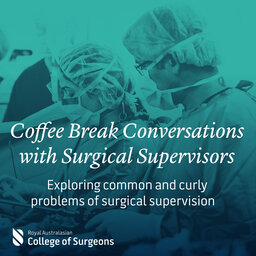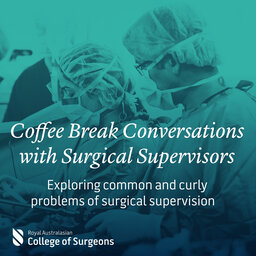Coffee Break Conversations with Surgical Supervisors
Surgeons’ roles are diverse, with many demands placed on their time and attention. Supervising Trainees and Specialist International Medical Graduates…Rebecca is an Otolaryngologist based in Wellington New Zealand. She is experienced in surgical education and supervision. She was a supervisor of training for nine years and the Chair of Otolaryngology for New Zealand for 4 years. During this time she became involved in curriculum writing and development. The skills, experience and interest in teaching and assessment prepared Rebecca well to take on the role as Chair of the RACS Professional Skills Curriculum Working Party. During this work she developed a particular interest in today’s topic of Judgement of clinical decision-making.
In this podcast Rebecca provided her insights in response to the following questions:
- What is competence in the area of judgment and clinical decision-making?
- What do patients and the community expect from surgeons with regard to judgement and decision-making?
- Can critical thinking frameworks be helpful?
- When might it be challenging to apply the principles of good judgment and clinical decision making?
- How to assess whether a trainee or SIMG is competent in judgment and decision making?
- How to support trainees and SIMGs develop their skills in this area especially if they are struggling?
To provide feedback, suggest topics for discussion, share ideas or offer to be a guest, please complete the feedback survey or email Catherine Hunt Medical Educator RACS Catherine.Hunt@surgeons.org.
Links to key pages on RACS Website:
Supervisor Support Hub | RACS (surgeons.org)
The Supervisor Framework | RACS (surgeons.org)
RACS Professional Skills Curriculum | RACS (surgeons.org)
The SET program | RACS (surgeons.org)
RACS eLearning Course
Human Factors: Decision making.
Recommended reading:
Australian Commission On Safety and Quality in Health Care. Shared decision making [Internet]. 2019 [cited 2023 Nov 15]. Available from: www.safetyandquality.gov.au/our-work/partnering-consumers/shared-decision-making
Crebbin, W., Beasley, S., Tobin, S., Guest, G., Duvivier, R., & Watters, D. (2019). Judgement: Clinical decision‐making as a core surgical competency. ANZ Journal of Surgery, 89(6), 760-763. https://doi.org/10.1111/ans.15098
Croskerry, P. (2017). A Model for Clinical Decision-Making in Medicine. Medical Science Educator, Published online: 14 December 2017. https://doi.org/10.1007/s40670-017-0499-9
Hoffmann, T. C., Légaré, F., Simmons, M. B., McNamara, K., McCaffery, K., Trevena, L. J., Hudson, B., Glasziou, P. P., & Del Mar, C. B. (2014). Shared decision making: What do clinicians need to know and why should they bother? Medical Journal of Australia, 201(1), 35-39. https://doi.org/10.5694/mja14.00002
Jenicek, M., Croskerry, P., & Hitchcock, D. L. (2011). Evidence and its uses in health care and research: the role of critical thinking. Medical science monitor: International Medical Journal of Experimental and Clinical Research, 17(1), RA12–RA17. https://doi.org/10.12659/msm.881321
Levett-Jones, T., Hoffman, K., Dempsey, J., Jeong, S. Y., Noble, D., Norton, C. A., Roche, J., & Hickey, N. (2010). The 'five rights' of clinical reasoning: an educational model to enhance nursing students' ability to identify and manage clinically 'at risk' patients. Nurse education today, 30(6), 515–520. https://doi.org/10.1016/j.nedt.2009.10.020
Little, A. S., & Wu, S. J. (2022). Cognitive bias and neurosurgical decision making. Journal of Neurosurgery, 137(1), 1-312. https://doi.org/10.3171/2021.9.JNS212058
Papp, K. K., Huang, G. C., Lauzon Clabo, L. M., Delva, D., Fischer, M., Konopasek, L., Schwartzstein, R. M., & Gusic, M. (2014). Milestones of critical thinking: A developmental model for medicine and nursing. Academic Medicine, 89(5), 715-720.
https://doi.org/10.1097/ACM.0000000000000220
Richards, J. B., Hayes, M. M., & Schwartzstein, R. M. (2020). Teaching clinical reasoning and critical thinking: From cognitive theory to practical application. Chest, 158(4), 1617-1628. https://doi.org/10.1016/j.chest.2020.05.525
Sharples, J. M., Oxman, A. D., Mahtani, K. R., Chalmers, I., Oliver, S., Collins, K., Austvoll-Dahlgren, A., & Hoffmann, T. (2017). Critical thinking in healthcare and education. BMJ (Online), 357, j2234-j2234. https://doi.org/10.1136/bmj.j2234
Thampy, H., Willert, E., & Ramani, S. (2019). Assessing clinical reasoning: Targeting the higher levels of the pyramid. Journal of General Internal Medicine: JGIM, 34(8), 1631-1636. https://doi.org/10.1007/s11606-019-04953-4
In 1 playlist(s)
Coffee Break Conversations with Surgical Supervisors
Surgeons’ roles are diverse, with many demands placed on their time and attention. Supervising Train…Social links
Follow podcast
Recent clips

Health Advocacy - Part 2
26:31

Health Advocacy - Part1
32:35

What makes a great surgical supervisor?
32:09
 Coffee Break Conversations with Surgical Supervisors
Coffee Break Conversations with Surgical Supervisors